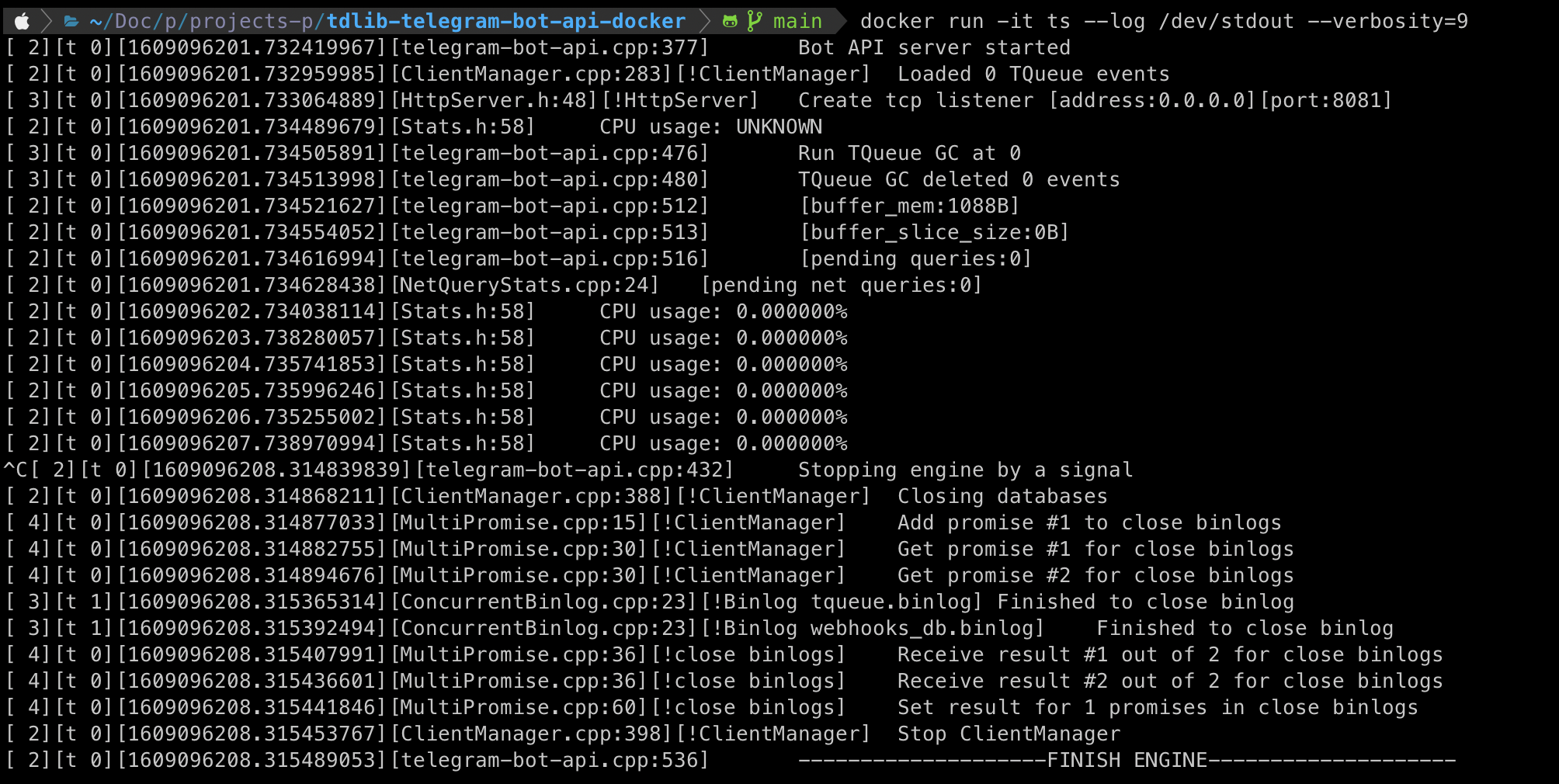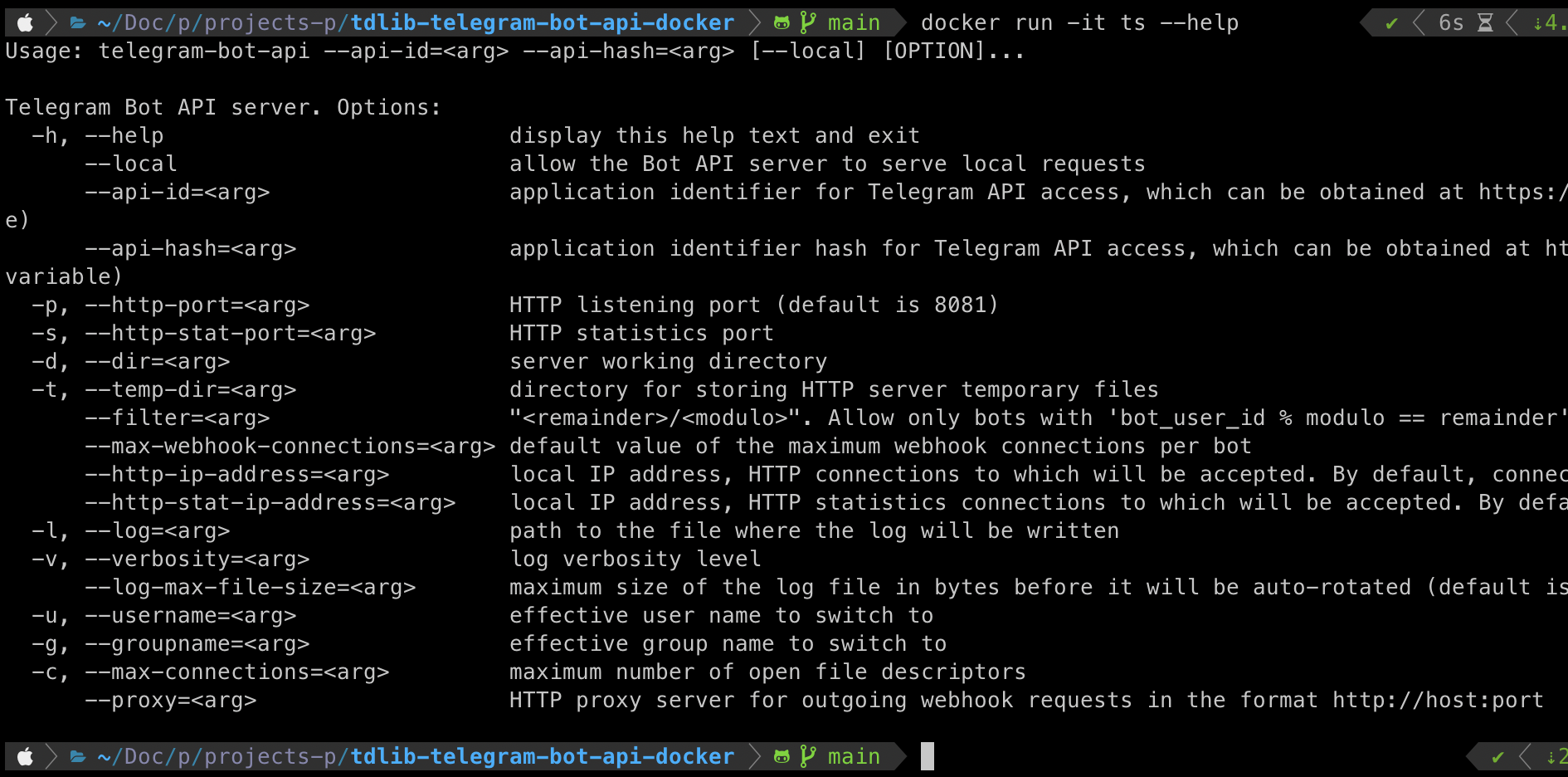Produce working, minimal Docker image for the Telegram Bot API server together with easy to use pipeline generating builds on the changes within the main repository managed by Telegram team.
This project does not modify any part of the tdlib/telegram-bot-api code.
As I do not modify any part of the server code I am not responsible for the way it works. For that purpose you should open an issue on the telegram bot api server issue tracker.
TL;DR: My responsibility ends when container and binary starts.
Build will be triggered automatically once a week to produce the latest version of the Telegram API Server. I would set it for the daily release but every build takes ~2.5 hours and generates additional costs on my side.
Images are versioned in format 1.0.x where x is a build number.
There's additional version tag added, for example api-5.1 where 5.1 is the version of Telegram API supported by the image.
Images created within this project support following architectures: AMD64 and ARM64
Yes, it means you can run them on regular servers and Raspberry Pi 4 and above as well! 🥳
You may need to authenticate with github (see this thread) to pull even the publicly available images. To do so you need to create Personal Access Token with read:packages scope and use it to authenticate your docker client with the Github Docker Registry.
Update: After move to GHCR.io there's no need authenticate and you should be able to pull images without any additional magic.
docker pull ghcr.io/lukaszraczylo/tdlib-telegram-bot-api-docker/telegram-api-server:latest
docker run -p 8081:8081 -e TELEGRAM_API_ID=yourApiID -e TELEGRAM_API_HASH=yourApiHash -t ghcr.io/lukaszraczylo/tdlib-telegram-bot-api-docker/telegram-api-server
Thing to remember: Entrypoint is set to the server binary, therefore you can still modify parameters on the go, as shown below
Example deployment within kubernetes cluster
# apiVersion: v1
# kind: PersistentVolumeClaim
# metadata:
# name: telegram-api
# spec:
# accessModes:
# - ReadWriteMany
# storageClassName: longhorn
# resources:
# requests:
# storage: 5Gi
---
apiVersion: apps/v1
kind: Deployment
metadata:
name: telegram-api
labels:
app: telegram-api
spec:
selector:
matchLabels:
app: telegram-api
replicas: 2
template:
metadata:
labels:
app: telegram-api
spec:
containers:
- name: bot-api
image: ghcr.io/lukaszraczylo/tdlib-telegram-bot-api-docker/telegram-api-server:latest
imagePullPolicy: Always
args: [ "--local", "--max-webhook-connections", "1000" ]
resources:
requests:
cpu: 100m
memory: 100Mi
limits:
cpu: 500m
memory: 500Mi
ports:
- containerPort: 8081
protocol: TCP
name: api
env:
- name: TELEGRAM_API_ID
value: "xxx"
- name: TELEGRAM_API_HASH
value: "yyy"
# volumeMounts:
# - name: shared-storage
# mountPath: /data
# volumes:
# - name: shared-storage
# persistentVolumeClaim:
# claimName: telegram-api
affinity:
nodeAffinity:
requiredDuringSchedulingIgnoredDuringExecution:
nodeSelectorTerms:
- matchExpressions:
- key: node-role.kubernetes.io/control-plane
operator: DoesNotExist
- key: node-role.kubernetes.io/storage
operator: DoesNotExist
- key: node-role.kubernetes.io/highmem
operator: Exists
